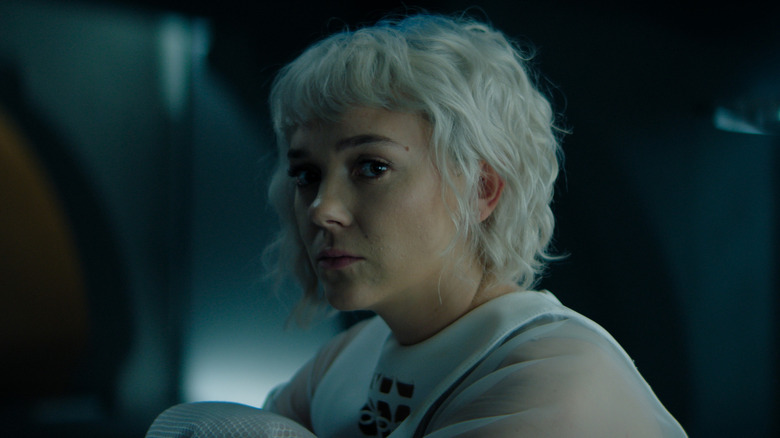Why Foundation Season 3 Gave The Mule A Very Different Goal Than The Books [Exclusive]
The following contains spoilers for the season 3 finale of "Foundation."
A big part of why Apple TV's "Foundation" works so well is that it takes the work of Isaac Asimov and brings it to the blockbuster space. The show, created by David S. Goyer and Josh Friedman, keeps the philosophical talk and complex sci-fi concepts from the source material but adds a level of spectacle mostly missing from the books (at least in the forefront). We've seen planet-killing Death Stars, grounded (and practical) battlegrounds, and a lot more, with season 3 of "Foundation" feeling reminiscent of Denis Villeneuve's "Dune" in how it takes a monumental piece of sci-fi literature and makes it digestible to all audiences with blockbuster-level spectacle.
A big part of how season 3 achieved this was by giving "Foundation" a singular villain to give the story some focus. The Mule served that function, proving such a big threat to the world of the show that he touched virtually every storyline. As played by Pilou Asbæk, the pirate warlord who we've known as the Mule for most of season 3 is a fantastic villain, a bloodthirsty sadist who outmaneuvers, outsmarts, and outfights everyone — a more accurate version of "Game of Thrones" character Euron Greyjoy than Asbæk actually got to play in that HBO series.
But that was all a ruse. In the finale of season 3, we learn that the pirate was not actually the Mule, he was actually just a pirate. Instead, the woman we've known as Bayta (Synnøve Karlsen), the spoiled rich airhead, is actually the powerful mentallic that's nearly brought the entire galaxy down to its knees. It's a twist that's sure to cause controversy among book readers, but it's also entirely in line with the ethos of "Foundation" as an adaptation because of what it says about individuals and the power of human connection to change history.
Bayta was on a quest for love
"Foundation" had already made big changes to the character of The Mule earlier in the season, starting with showing us who he "is" at the start of the season, which helped pave the way for the surprise twist. Then we got a flashback showing the Mule's backstory, which is vastly different than what we know of his upbringing from the books. In the finale, we learn that the pirate warlord we've been following all season long was just a scapegoat, and the real Mule was actually Bayta using him. She even infused him with her own memories so he genuinely believed himself to be the Mule.
In truth, though the basic story is the same — a kid born to parents on a farm world with a one-child policy who just gave birth to another baby, then they are found out and the parents try to drown the Mule — the clear difference is how gender plays into the origin story.
In an exclusive interview with /Film, Synnøve Karlsen spoke of the Mule reveal and how that flashback scene plays out now. "I think it feeds in slightly to gender as well," Karlsen said. "The parents were more keen on the idea of having a son than a daughter because a son would bring more value to them as a family."
That small change brings a new layer to the cruelty the Mule faced as a kid that made the character be against the Foundation as much as they are against the Empire. But for Karlsen, it also means that Bayta's goal and motivation as the Mule is different than what book readers are expecting of the conquering dictator from the novels. "I think that's all that she acts with, is the intention of people to really love each other," she adds. "And I think there's something in that loss and that betrayal from her parents that ignites this quest for people to also love her. Because the people who were meant to didn't enough."
The destroyer of worlds
The thing about the "Bayta as the Mule" twist rather than it being Magnifico is that it hits right at the core of "Foundation" as an adaptation. On the surface, there's the fact that the show manages to maintain the surprise of the Mule being someone the audience would not suspect, even from book readers who thought they knew what was coming. Who is less suspicious than the kind-hearted but entitled rich airhead celebrity?
But what makes the change special is what it has to say about psychohistory and humanity as a whole. In the books, the main purpose of the Mule is to show that there are people that psychohistory cannot account for. His abilities made him unpredictable, which is how he manages to accomplish so much. In the show, Bayta takes on another layer of meaning — the importance and impact of relationships and of individuals on history. Season 2 of "Foundation" was all about this theme, with Gaal (Lou Llobell) arguing with her mentor Hari Seldon (Jared Harris) over whether individual choices mattered in the grand scheme of things, as psychohistory (a form of mathematics that can predict events and actions) can't account for individual people, only masses. That Bayta managed to become a threat big enough that she essentially took down the Foundation while making the Empire destroy itself definitely shows the power of individuals, but it's why she's doing all this that matters more.
"I think Bayta is not a bad person, either. I think she sincerely cares for people and doesn't want people to be in pain," Karlsen said, explaining that Bayta's goal is to unite people and make them all love each other (and her, of course). Granted, this definitely means she's taking away free will, and she's committing a whole lot of murders to achieve it, but deep down, the thing that nearly destroys the world is not the movement of masses, but the actions of a single individual with a deep longing for love and connection.
"Foundation" is streaming on Apple TV+.


